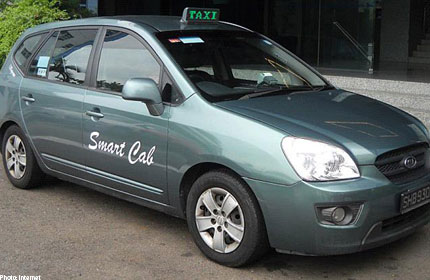
SINGAPORE - The LTA noted that Smart had multiple failures in its service standards over the past two years, such as consistently failing to meet the call booking cater rate. It also failed other standards such as accident rate and first inspection passing rate.
The Land Transport Authority (LTA) has informed Smart that its Taxi Service Operator Licence (TSOL) will not be renewed when it expires on 30 September 20131. The decision is based on a review of Smart's compliance with the taxi Quality of Service (QoS) standards and its ability to meet the minimum requirements for TSOL renewal.
Deterioration in Smart's service performance
Smart has had multiple failures in its QoS performance over the past two-and-a-half years. For example, it has consistently failed to meet the call booking cater rate2 standard throughout the entire period.
Call booking is an important part of the taxi QoS standards as it gives commuters the assurance that they will be able to get a taxi for an urgent and/or important journey. Call booking standards are also an efficient way to match taxi supply with demand and thus reduce the empty cruising of taxis.
Smart has also failed in other QoS standards such as accident rate and first inspection passing rate, which are a concern as this affects the safety of taxi commuters.
Lack of commitment by Smart to meet regulatory conditions
Taxi companies were notified in March 2012 that they had to fulfil the following requirements that are put in place to enhance the overall taxi service levels, before their TSOLs would be renewed:

Equip their taxi fleet with the capability to locate their taxis within the vicinity of a commuter making a call booking for quicker and more efficient assignment of taxis;
Achieve a minimum fleet size of 800 taxis;
Equip their taxi fleet with a centrally-controlled "on-call" booking display sign for:
o 40 per cent of their taxi fleet by December 2013;
o 100 per cent of their taxi fleet by December 2015.
Smart has not made substantial progress towards meeting these TSOL renewal conditions. Smart shrank its taxi fleet from 701 taxis in January 2012 to 517 taxis in August 2012, and further to 268 taxis in June 2013, instead of increasing it to meet the minimum fleet size requirement of 800 taxis.
It has also not equipped its taxi fleet with the capability to poll taxis within the vicinity of the caller, or with a centrally-controlled "on-call" display sign. LTA has engaged Smart on numerous occasions to discuss their QoS performance and to understand the reasons for their non-compliance but there has been no notable improvement.
Hence, LTA's assessment is that Smart will not be able to meet the conditions for TSOL renewal, given its past performance and its lack of demonstrable commitment to improving its current performance against the TSOL renewal conditions.
Total taxi industry fleet to remain stable
LTA's immediate priority is to minimise the impact on commuters and to work with Smart to help it fulfil its obligations to its taxi drivers. Even though Smart's 268 taxis account for less than 1 per cent of the total taxi fleet of 27,781 (as at 30 June 2013), LTA will nonetheless be facilitating the transfer of Smart's eligible taxi licences to other taxi companies3. The taxis taken over from Smart will not be counted towards the annual 2 per cent cap on the growth of each taxi company's fleet. This is to ensure that the overall taxi fleet does not decline as a result of Smart's exit from the industry.
Placement for Smart's taxi drivers
Mr Yeo Teck Guan, Group Director, Public Transport, LTA said, "LTA has met Smart on 10 July to inform Smart of its decision to not renew its licence. At the meeting, Smart has assured LTA that it would fulfil its responsibility towards its taxi drivers, and to assist and secure placement for them with other taxi companies. LTA will work with Smart to provide the necessary assistance to facilitate an orderly exit with minimum impact on commuters and drivers."

